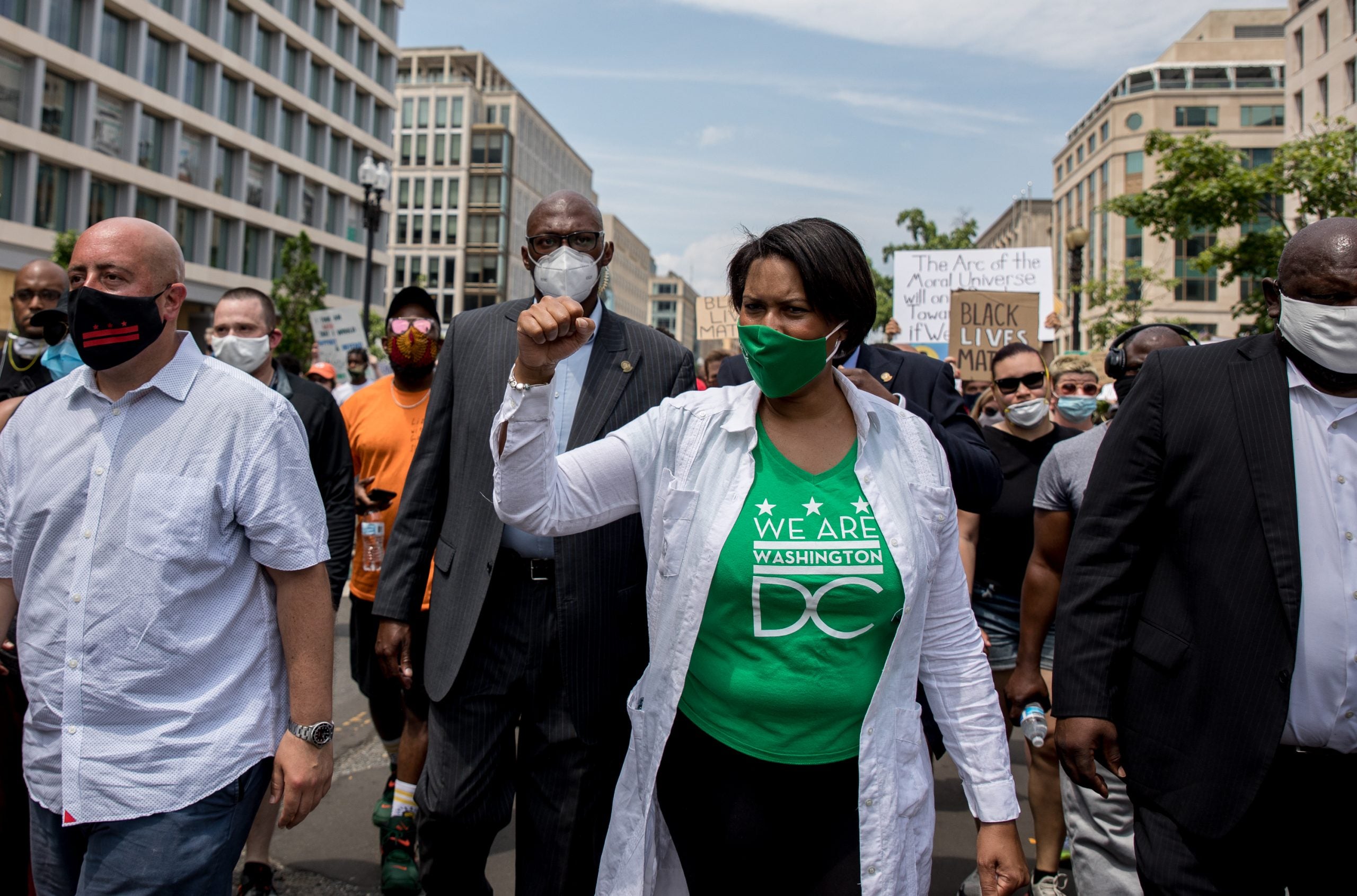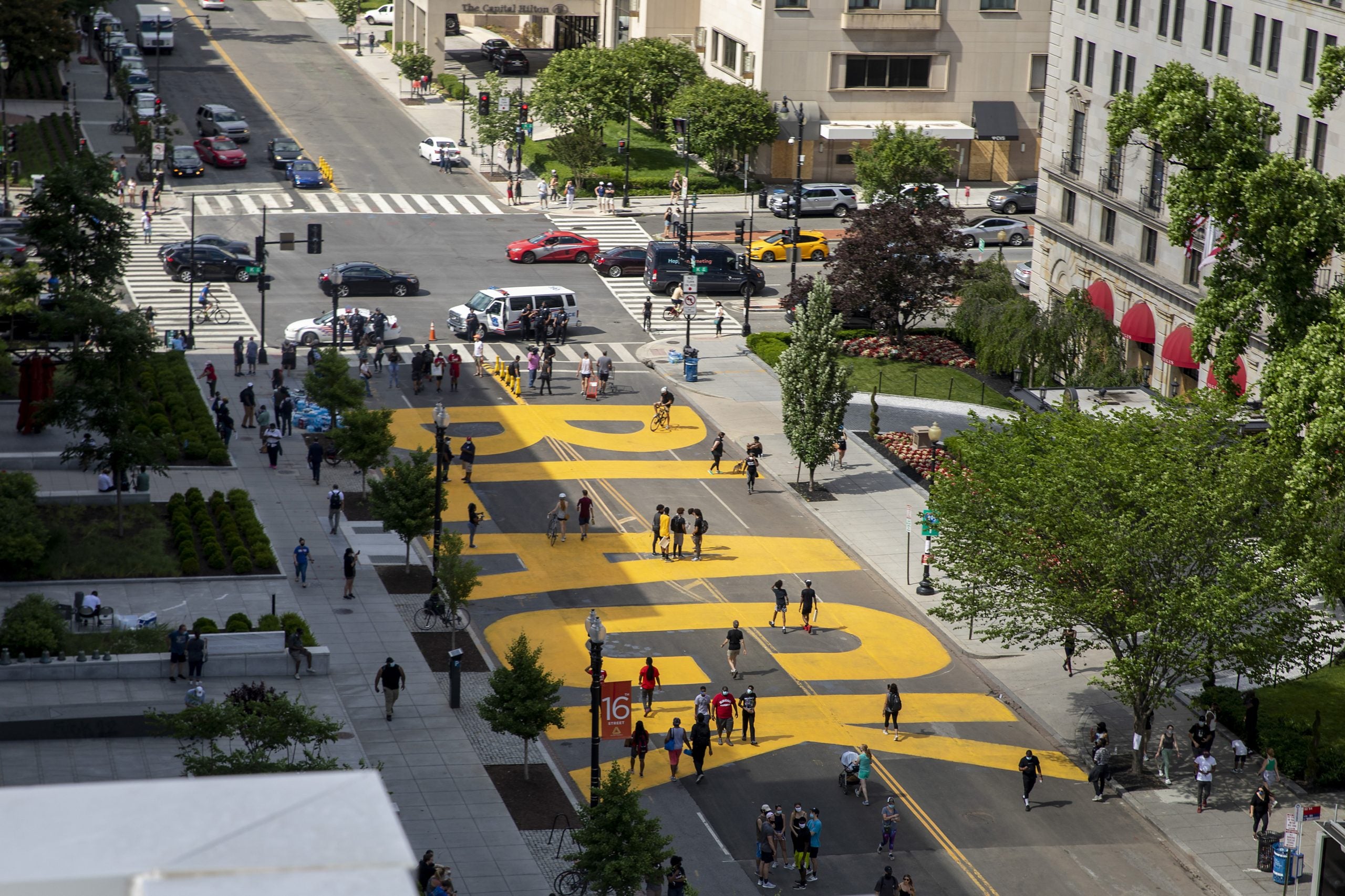Last week Friday, DC Mayor Muriel Bowser unveiled “Black Lives Matter Plaza,” a portion of 16th Street, located right in front of the White House. To make her message clear, the Democratic politician also painted the street with the rallying cry of protesters in bold yellow lettering, leading right up to where the impeached president occasionally resides.
It was a move that caught the attention of those on social media who enjoyed the petty nature of such a gesture. This is especially given Donald Trump’s history with race and racism, as well as his attacks—verbal and non-verbal—against peaceful protesters demanding justice and police accountability.
“A day earlier there had been federal troops who had blocked that portion of 16th street, which is a DC street. And we certainly wanted to reclaim it for our use, for people moving around town, walking downtown and protesting as part of the demonstrations against George Floyd’s death,” Bowser explained to ESSENCE in a phone conversation earlier this week. “We also thought having an affirming message where people could come safely and address their government with the message of ‘Black Lives Matter’ was very important at this point in our country, following the Monday incident where federal forces used some kind of gas to disperse peaceful protesters.”
Of course, the street renaming, and the bold mural painted on the plaza did not go unnoticed by Trump who, almost predictably lashed out, calling the mayor “incompetent.”
But the DC mayor remained unfazed, only stating “Anytime that a United States president is attacking an American mayor, he’s missed the point. His job is to protect us against foreign adversaries and to support cities and states in the United States of America.”
The mayor said that currently, her administration is focused on listening to activists about how police and community relations can be improved, while touting measures that DC police have taken towards reform.
“A lot of things that jurisdictions around the country are now considering, we already have in place, like body-worn camera, de-escalation training, mental health diversion upon crime scenes, violence interruption in schools and in neighborhoods,” Bowser said. “So, we have put in place and continue to build on each and every day, very critical reforms. We also take a budgeting approach for public safety that’s bigger than the police. It includes what we’re doing in job training, and schools, and housing, and ending homelessness. That really, I think, set our investments apart in the nation.”
However, some activists, like those from Black Lives Matter DC, remain unimpressed and unconvinced, slamming the street renaming and mural as “performative distraction” and demanding that Bowser take steps to defund the police.
“We just know that the mayor is actually very supportive of police, supportive of adding to the police budget,” Makia Green with Black Lives Matter DC told ESSENCE. “And in this moment, when Black Lives Matter is demanding that we defund the police, we felt like she was misrepresenting our demands in kind of co-opting a movement that came out against police brutality.”
“The mayor is the one person in the city who actually has the power to make structural change when it comes to police brutality. She has the ability to release the tapes for Marquese Alston, who was killed by police, to the public,” Green added. “She has the ability to do that, and she chooses not to. And so, we felt like her mural was to really appease people who don’t know DC, who don’t know Black Lives Matter DC, and appease white liberals while ignoring our demands.”
On Friday, Georgetown Law’s Civil Rights Clinic announced that it had filed a $100 million wrongful death suit against D.C. and its police department on behalf of Kenithia Alston, Marquese Alston’s mother.
“It’s been two years since police killed my son and they still haven’t publicly released the body-cam footage or got their story straight about what happened that night,” Kenithia Alston said in the press release. “Nothing they have told me adds up. They can’t just get away with killing Marqueese by refusing to release evidence.”
Black Lives Matter DC released a statement demanding justice for those killed by police in DC, and making their demands, which also included police-free schools, the decriminalization of sex work, and other issues, clear.
“We want to slash the budget until zero and invest in community-led violence interruption programs that are independent of law enforcement. Programs that we worked on, programs that are actually working in the city that their budgets have been underfunded,” Green said. “We want police out of schools and…mental health workers in schools.”
“Policing is not a solution to the root causes of violence, of hurt, and trauma,” Green added. “And it’s time that we start putting funding into the things that actually will help us heal as a community, of having social workers who respond, mental health practitioners who can respond to things. It’s not that we don’t need an emergency response. It’s the fact that we don’t need the police.”
When asked about the group’s criticisms, Bowser reiterated that “We listen and are responsive to activists, including at this local chapter of Black Lives Matter, but we know what it takes to keep our neighborhoods safe. And that includes investments in MPD.”
“What many critics won’t tell you is that in the five years that I’ve been mayor, we’ve seen only a 12 percent increase in police investments while our population and calls for service have grown,” Bowser countered. “In schools, for example, we’ve seen a 40 percent increase [in investments]. In homeless services and the human services, we’ve seen a 75 percent increase. In health, we’ve seen over a 40 percent increase. So, we’re walking the walk. We invest in police resources, but we also invest in all manner of human services interventions.”

As for next steps, Bowser says that the way forward is going to take a much larger nation-wide approach, not only from the U.S. Congress, but from voters alike.
“I was pleased to see that the Democrats in the House and Senate come together on a national reform package, which can make sense out of what individual cities and states do in a national framework, which is important,” she said. “My question [that] I would throw back at all the demonstrators and protestors across America, are we going to get a new Senate? Are we going to get a new president in November? Are people going to vote? And those are all important questions that will shape our agenda moving forward.”
